Let’s cut to the chase: How much control do you really have over your choices? Aristotle, the OG philosopher of common sense, dropped truth bombs about voluntary vs involuntary actions over 2,300 years ago—and his insights are perfect for our modern “but it’s not my fault!” culture. In his Nicomachean Ethics, he explains why some choices earn you praise (or blame), how courage works in real life, and why building virtuous habits is like leveling up in a video game. Spoiler: Your daily decisions sculpt your character—and Aristotle’s got receipts.
Here’s the deal: If you act voluntarily—meaning you knew what you were doing and chose it freely (like donating to a food bank)—you own the moral credit. But if you’re forced or clueless (like accidentally texting your boss a meme meant for your BFF), that’s involuntary, and you deserve a pass. Even sticky “mixed” actions (think: lying to protect a friend) boil down to your call. The kicker? True courage and temperance aren’t about being fearless or saying “no” to pizza forever—they’re about finding balance on purpose.
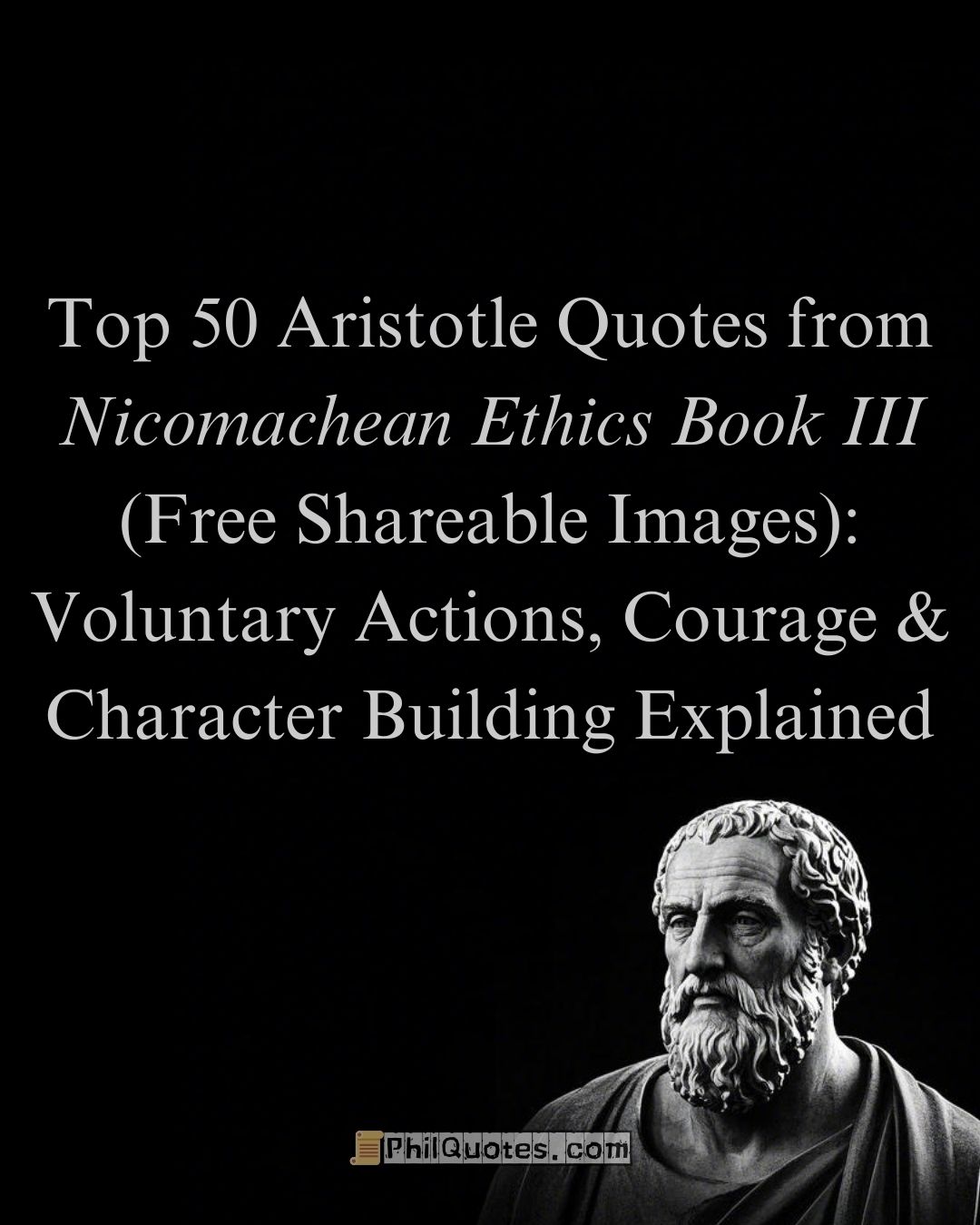
Want to see how this plays out? Check out Aristotle’s quotes below—click any one to visit PhilQuotes.com, where each quote comes with a custom image and a quick 60-second text explainer (no videos, we promise!). Bookmark your favorites, share them with friends, and drop a comment about your own “virtue wins” (or fails!). Let’s get philosophical—no toga required.
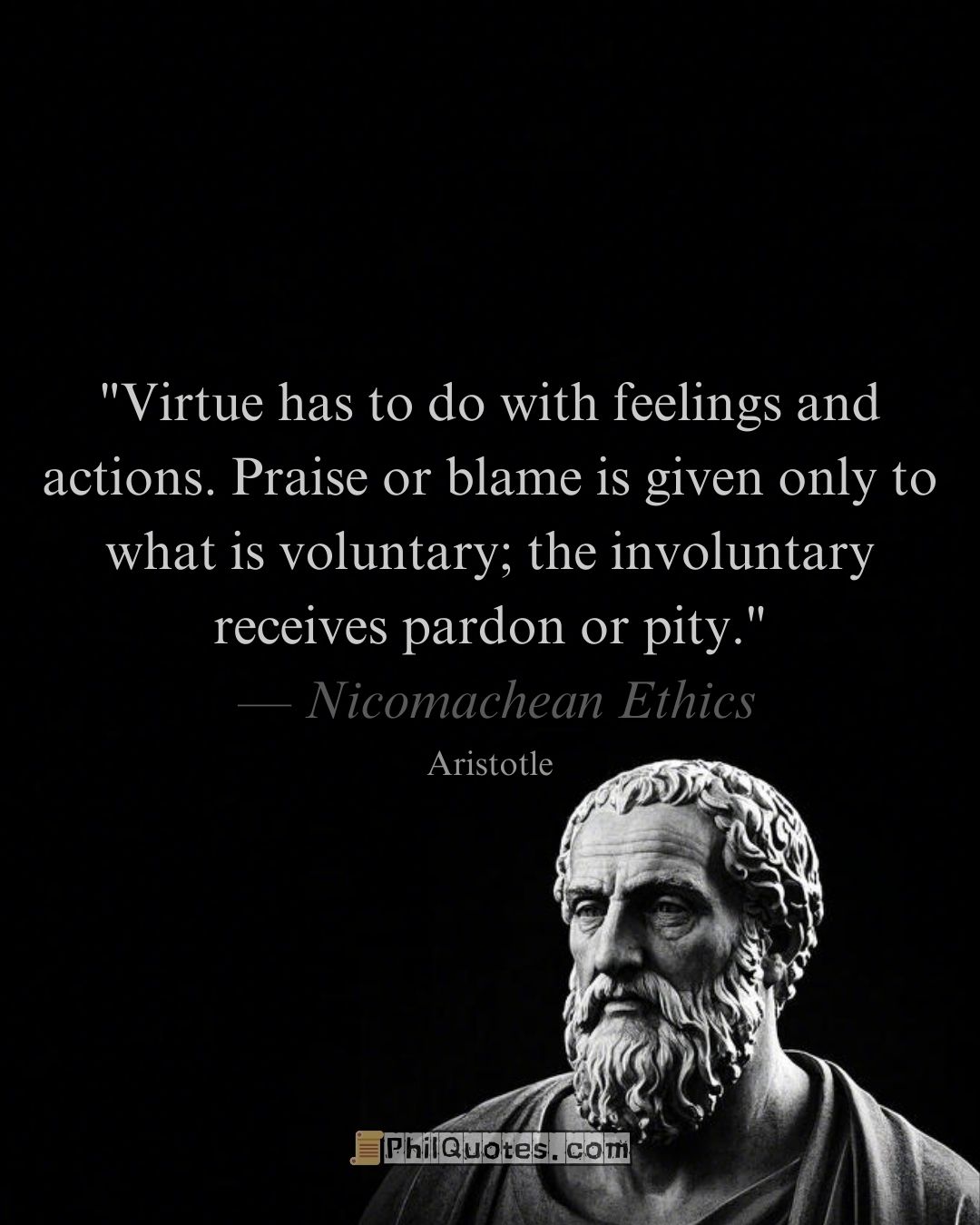
1. “Virtue has to do with feelings and actions. Praise or blame is given only to what is voluntary; the involuntary receives pardon or pity.”
— Aristotle, Nicomachean Ethics, Book III, Chapter 1
(Translated by W.D. Ross)
2. “That is involuntary which is done under compulsion or through ignorance.”
— Aristotle, Nicomachean Ethics, Book III, Chapter 1
(Translated by W.D. Ross)
3. “Acts done to avoid greater evil are of mixed nature but resemble voluntary acts.”
— Aristotle, Nicomachean Ethics, Book III, Chapter 1
(Translated by W.D. Ross)
4. “The voluntary act is originated by the doer with knowledge of the circumstances.”
— Aristotle, Nicomachean Ethics, Book III, Chapter 1
(Translated by W.D. Ross)
5. “Compulsion is external; the agent contributes nothing to the act.”
— Aristotle, Nicomachean Ethics, Book III, Chapter 1
(Translated by W.D. Ross)
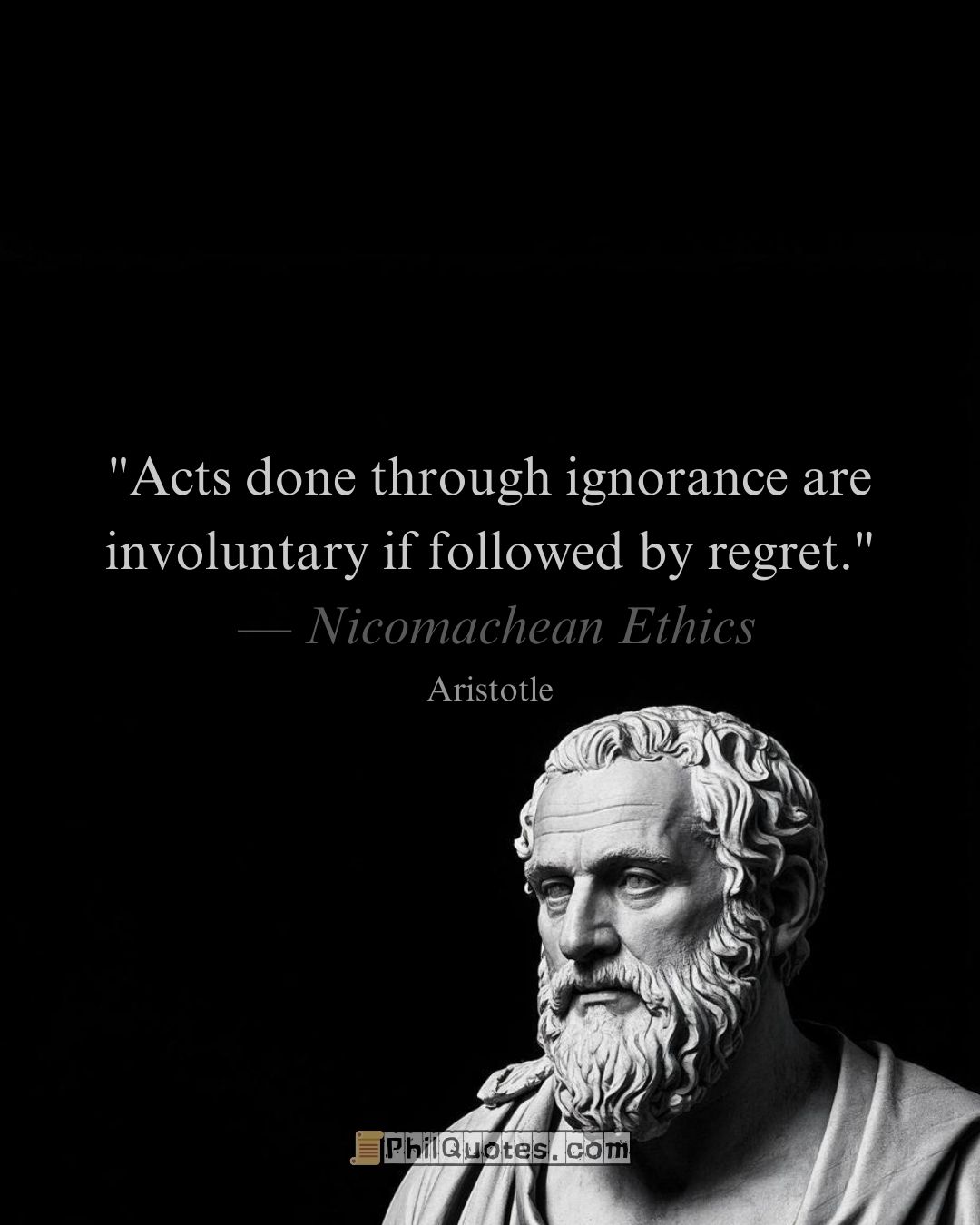
6. “Acts done through ignorance are involuntary if followed by regret.”
— Aristotle, Nicomachean Ethics, Book III, Chapter 1
(Translated by W.D. Ross)
7. “Ignorance of particulars (who, what, how) makes an act involuntary.”
— Aristotle, Nicomachean Ethics, Book III, Chapter 1
(Translated by W.D. Ross)
8. “Acts from anger or desire are voluntary; even children and animals act voluntarily.”
— Aristotle, Nicomachean Ethics, Book III, Chapter 1
(Translated by W.D. Ross)
9. “Choice implies deliberation; it is deliberate desire for what is in our power.”
— Aristotle, Nicomachean Ethics, Book III, Chapter 2
(Translated by W.D. Ross)
10. “Choice is not appetite, anger, wish, or opinion, but deliberate preference.”
— Aristotle, Nicomachean Ethics, Book III, Chapter 2
(Translated by W.D. Ross)
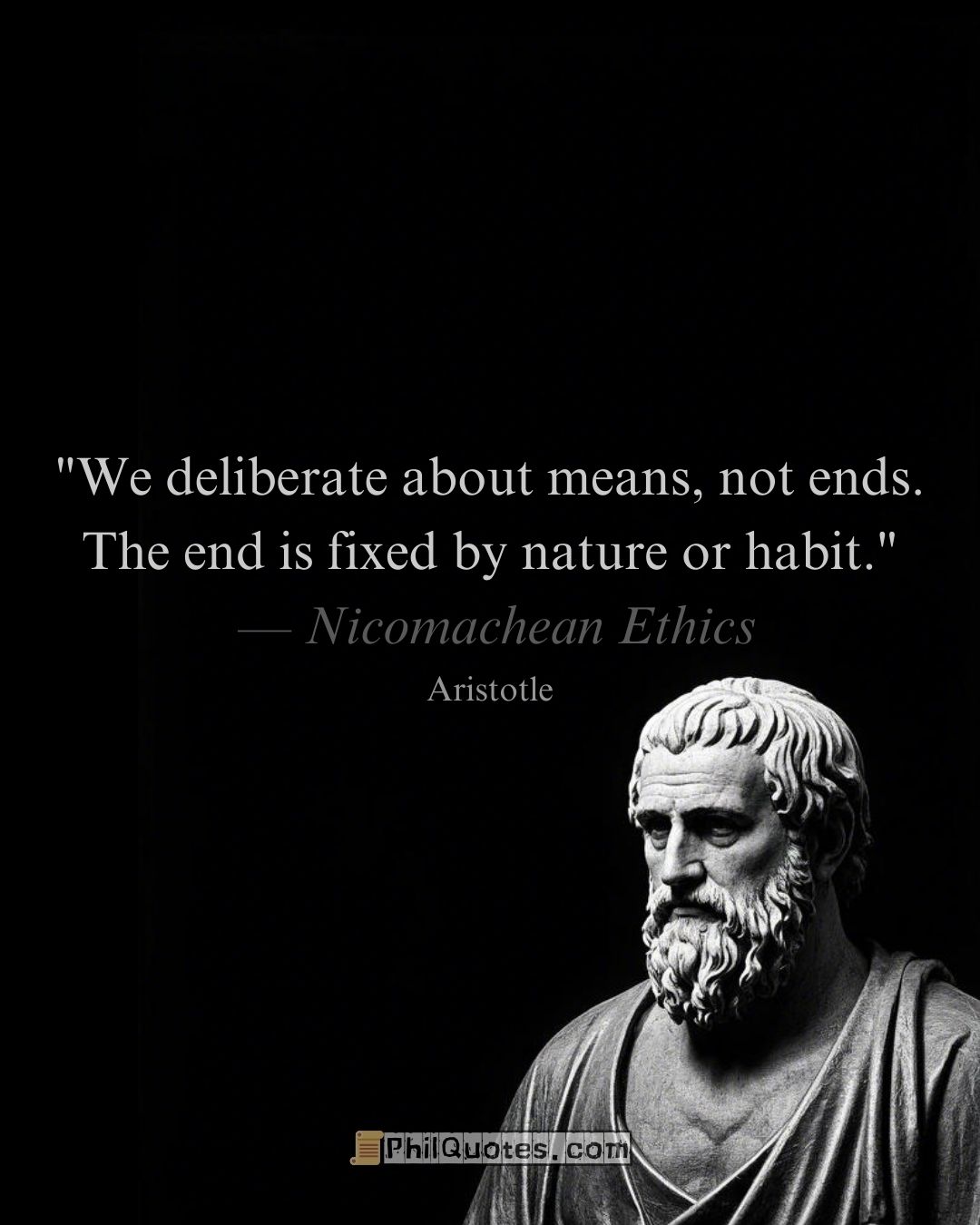
11. “We deliberate about means, not ends. The end is fixed by nature or habit.”
— Aristotle, Nicomachean Ethics, Book III, Chapter 3
(Translated by W.D. Ross)
12. “Deliberation stops when we trace the cause back to ourselves—the choosing part.”
— Aristotle, Nicomachean Ethics, Book III, Chapter 3
(Translated by W.D. Ross)
13. “Wish is for the end; choice is for the means to the end.”
— Aristotle, Nicomachean Ethics, Book III, Chapter 4
(Translated by W.D. Ross)
14. “The good man wishes for the true good; the bad man for apparent good.”
— Aristotle, Nicomachean Ethics, Book III, Chapter 4
(Translated by W.D. Ross)
15. “Virtue and vice depend on ourselves; we shape character through repeated acts.”
— Aristotle, Nicomachean Ethics, Book III, Chapter 5
(Translated by W.D. Ross)
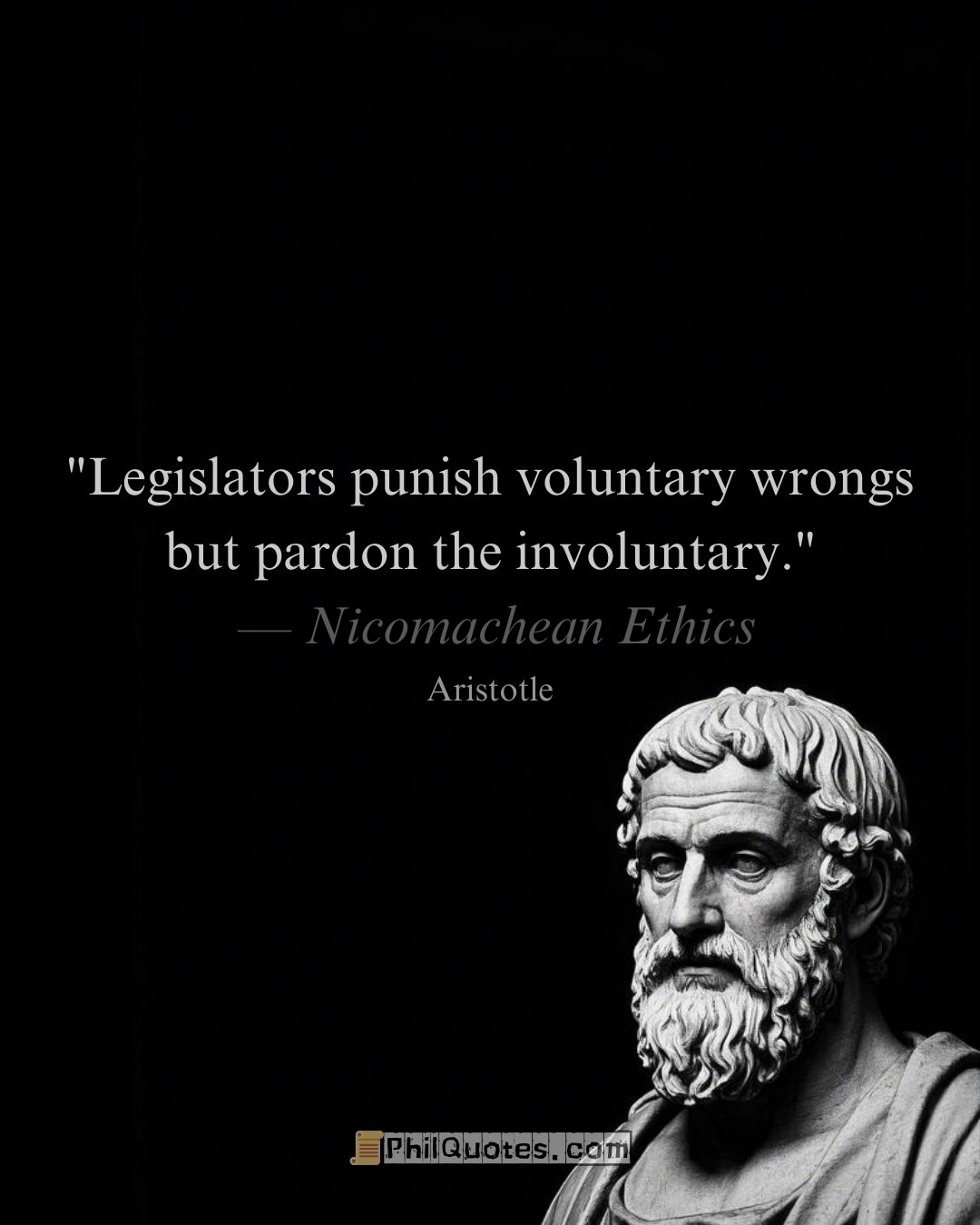
16. “Legislators punish voluntary wrongs but pardon the involuntary.”
— Aristotle, Nicomachean Ethics, Book III, Chapter 5
(Translated by W.D. Ross)
17. “Ignorance from negligence is culpable; one could have taken care to know.”
— Aristotle, Nicomachean Ethics, Book III, Chapter 5
(Translated by W.D. Ross)
18. “Vice is voluntary; no one becomes unjust except by choosing unjust acts.”
— Aristotle, Nicomachean Ethics, Book III, Chapter 5
(Translated by W.D. Ross)
19. “Courage is moderation regarding fear and confidence, especially in noble death.”
— Aristotle, Nicomachean Ethics, Book III, Chapter 6
(Translated by W.D. Ross)
20. “The courageous man faces terror for the sake of the noble, as reason bids.”
— Aristotle, Nicomachean Ethics, Book III, Chapter 7
(Translated by W.D. Ross)
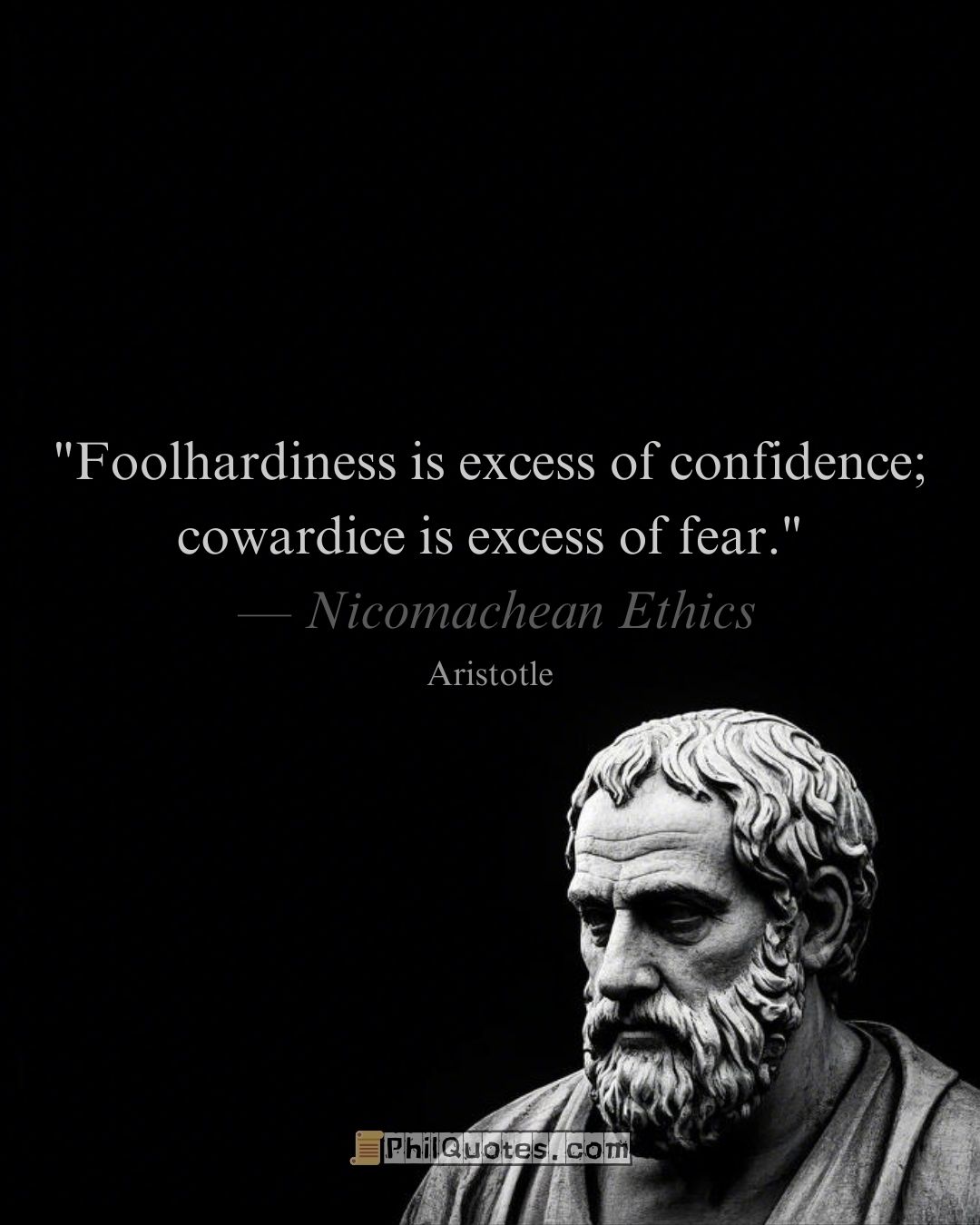
21. “Foolhardiness is excess of confidence; cowardice is excess of fear.”
— Aristotle, Nicomachean Ethics, Book III, Chapter 7
(Translated by W.D. Ross)
22. “Political courage resembles true courage but is driven by honor and shame.”
— Aristotle, Nicomachean Ethics, Book III, Chapter 8
(Translated by W.D. Ross)
23. “Courage in sudden danger is truer than in foreseen peril, as it reveals character.”
— Aristotle, Nicomachean Ethics, Book III, Chapter 8
(Translated by W.D. Ross)
24. “Temperance is moderation in bodily pleasures, not pains.”
— Aristotle, Nicomachean Ethics, Book III, Chapter 10
(Translated by W.D. Ross)
25. “Profligacy is excess in pursuing base pleasures; temperance rejects them.”
— Aristotle, Nicomachean Ethics, Book III, Chapter 10
(Translated by W.D. Ross)
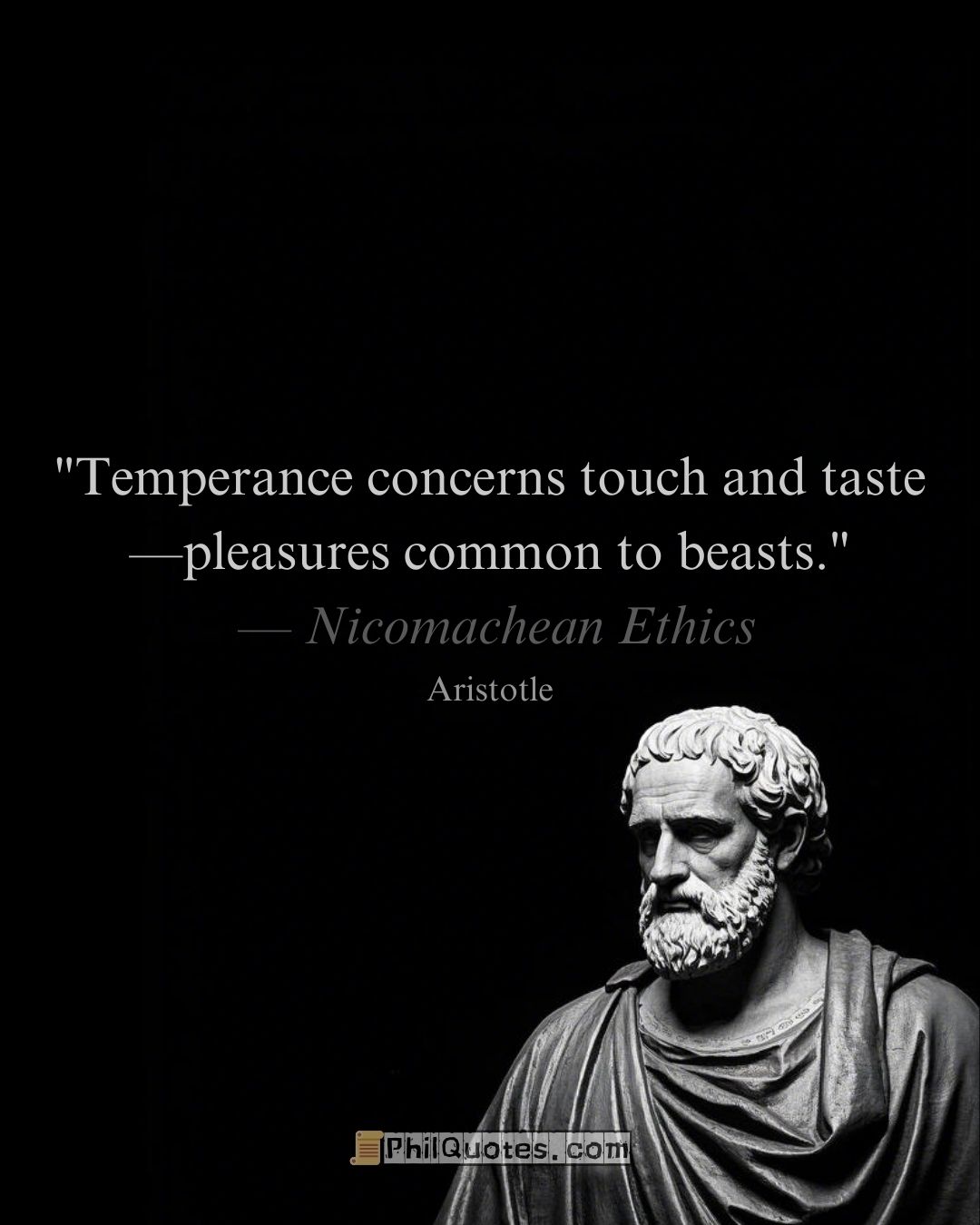
26. “Temperance concerns touch and taste—pleasures common to beasts.”
— Aristotle, Nicomachean Ethics, Book III, Chapter 10
(Translated by W.D. Ross)
27. “The temperate man desires what he ought, as reason prescribes.”
— Aristotle, Nicomachean Ethics, Book III, Chapter 11
(Translated by W.D. Ross)
28. “Profligacy is more voluntary than cowardice, being driven by pleasure, not pain.”
— Aristotle, Nicomachean Ethics, Book III, Chapter 12
(Translated by W.D. Ross)
29. “Vicious habits begin with voluntary acts; one becomes unjust by choosing injustice.”
— Aristotle, Nicomachean Ethics, Book III, Chapter 5
(Translated by W.D. Ross)
30. “To say vice is involuntary is to deny man’s agency in forming character.”
— Aristotle, Nicomachean Ethics, Book III, Chapter 5
(Translated by W.D. Ross)
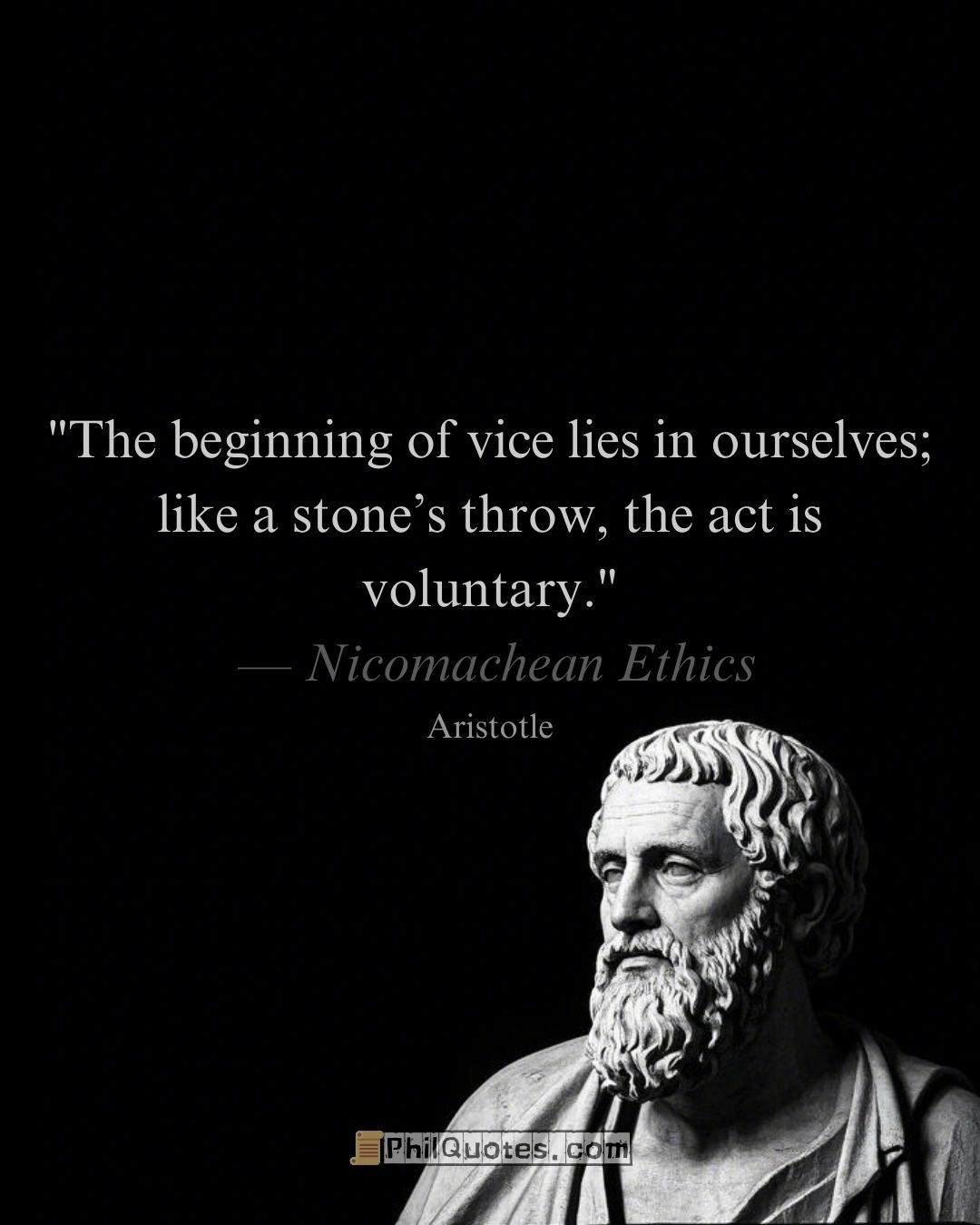
31. “The beginning of vice lies in ourselves; like a stone’s throw, the act is voluntary.”
— Aristotle, Nicomachean Ethics, Book III, Chapter 5
(Translated by W.D. Ross)
32. “Bodily vices (e.g., self-induced sickness) are voluntary and blameworthy.”
— Aristotle, Nicomachean Ethics, Book III, Chapter 5
(Translated by W.D. Ross)
33. “All men desire the apparent good, but the good man discerns the true good.”
— Aristotle, Nicomachean Ethics, Book III, Chapter 4
(Translated by W.D. Ross)
34. “Courage chooses noble action despite pain, knowing the loss of life’s best things.”
— Aristotle, Nicomachean Ethics, Book III, Chapter 9
(Translated by W.D. Ross)
35. “The courageous endure death in war most nobly, facing the greatest terror.”
— Aristotle, Nicomachean Ethics, Book III, Chapter 6
(Translated by W.D. Ross)
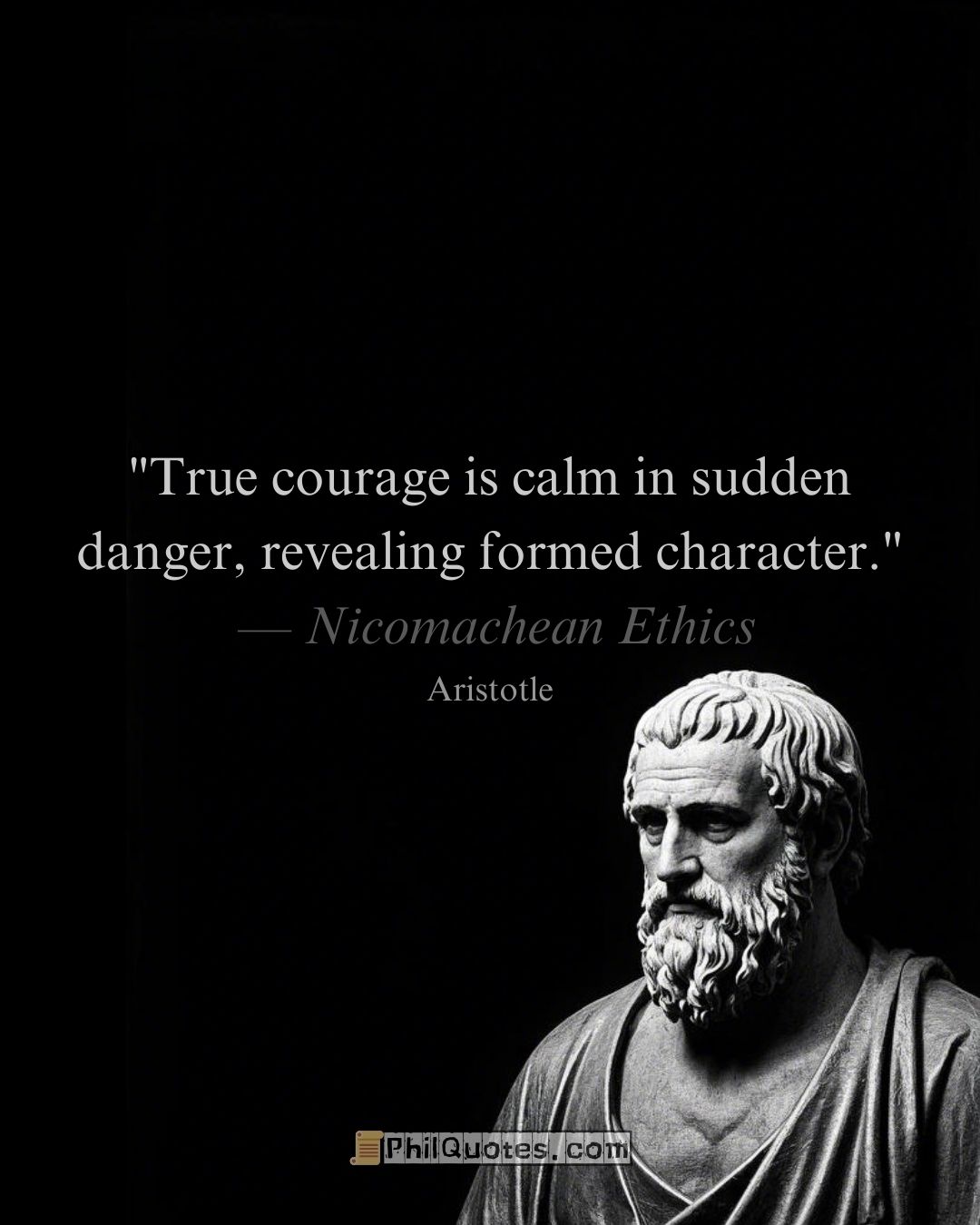
36. “True courage is calm in sudden danger, revealing formed character.”
— Aristotle, Nicomachean Ethics, Book III, Chapter 8
(Translated by W.D. Ross)
37. “Temperance rejects excessive pleasures, seeking health and nobility.”
— Aristotle, Nicomachean Ethics, Book III, Chapter 11
(Translated by W.D. Ross)
38. “Profligacy is loving base pleasures more than all else—a brutish state.”
— Aristotle, Nicomachean Ethics, Book III, Chapter 10
(Translated by W.D. Ross)
39. “The temperate man’s appetites harmonize with reason, both aiming at the noble.”
— Aristotle, Nicomachean Ethics, Book III, Chapter 12
(Translated by W.D. Ross)
40. “Choice is prior to action; virtue lies in choosing the mean as right reason directs.”
— Aristotle, Nicomachean Ethics, Book III, Chapter 2
(Translated by W.D. Ross)
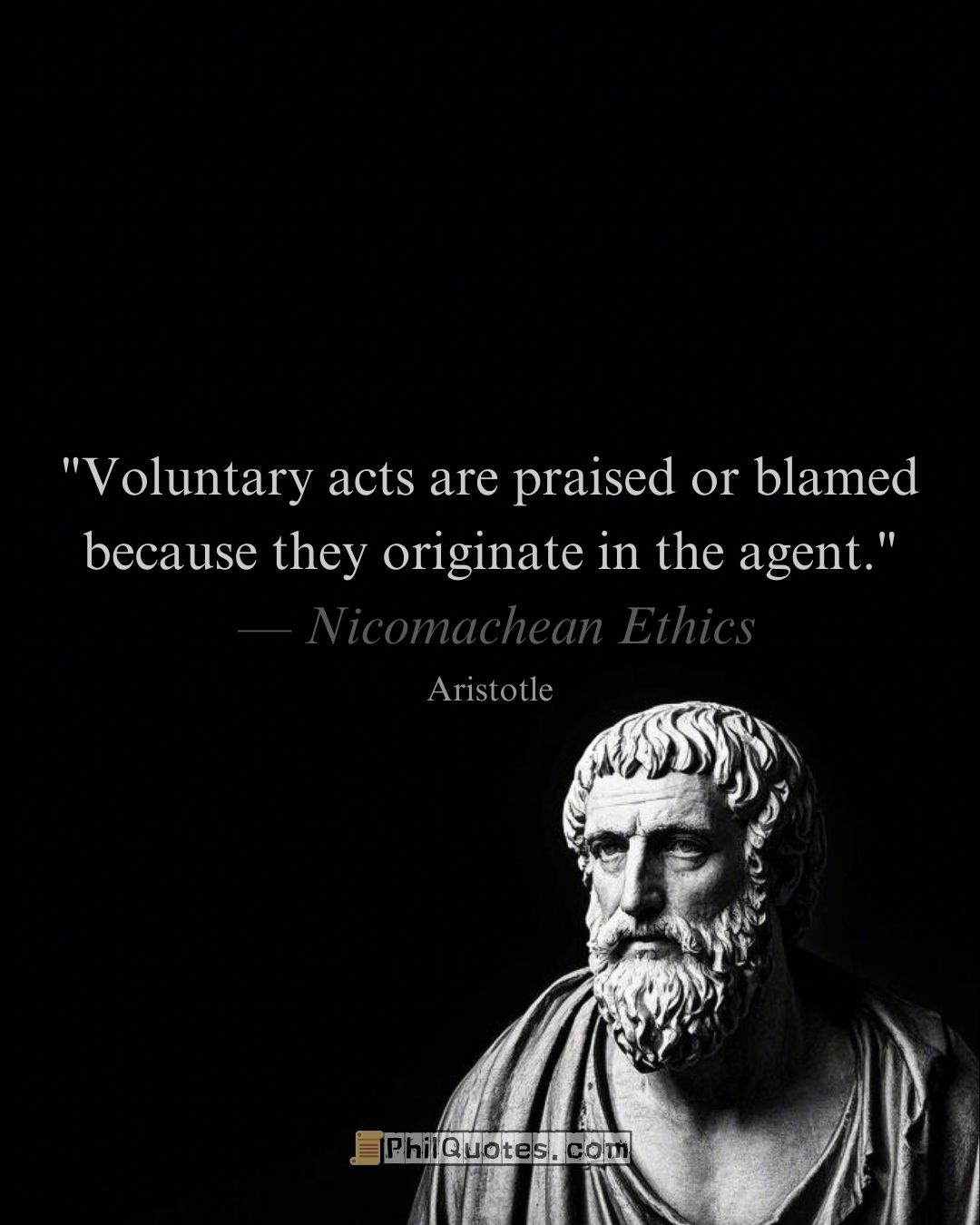
41. “Voluntary acts are praised or blamed because they originate in the agent.”
— Aristotle, Nicomachean Ethics, Book III, Chapter 1
(Translated by W.D. Ross)
42. “Ignorance of universal principles (e.g., justice) is vice, not involuntary error.”
— Aristotle, Nicomachean Ethics, Book III, Chapter 1
(Translated by W.D. Ross)
43. “Deliberation is inquiry into means; we do not deliberate about eternal truths.”
— Aristotle, Nicomachean Ethics, Book III, Chapter 3
(Translated by W.D. Ross)
44. “The object of wish is the good; the apparent good varies with character.”
— Aristotle, Nicomachean Ethics, Book III, Chapter 4
(Translated by W.D. Ross)
45. “Virtue makes the end right; practical wisdom makes the means right.”
— Aristotle, Nicomachean Ethics, Book III, Chapter 3
(Translated by W.D. Ross)
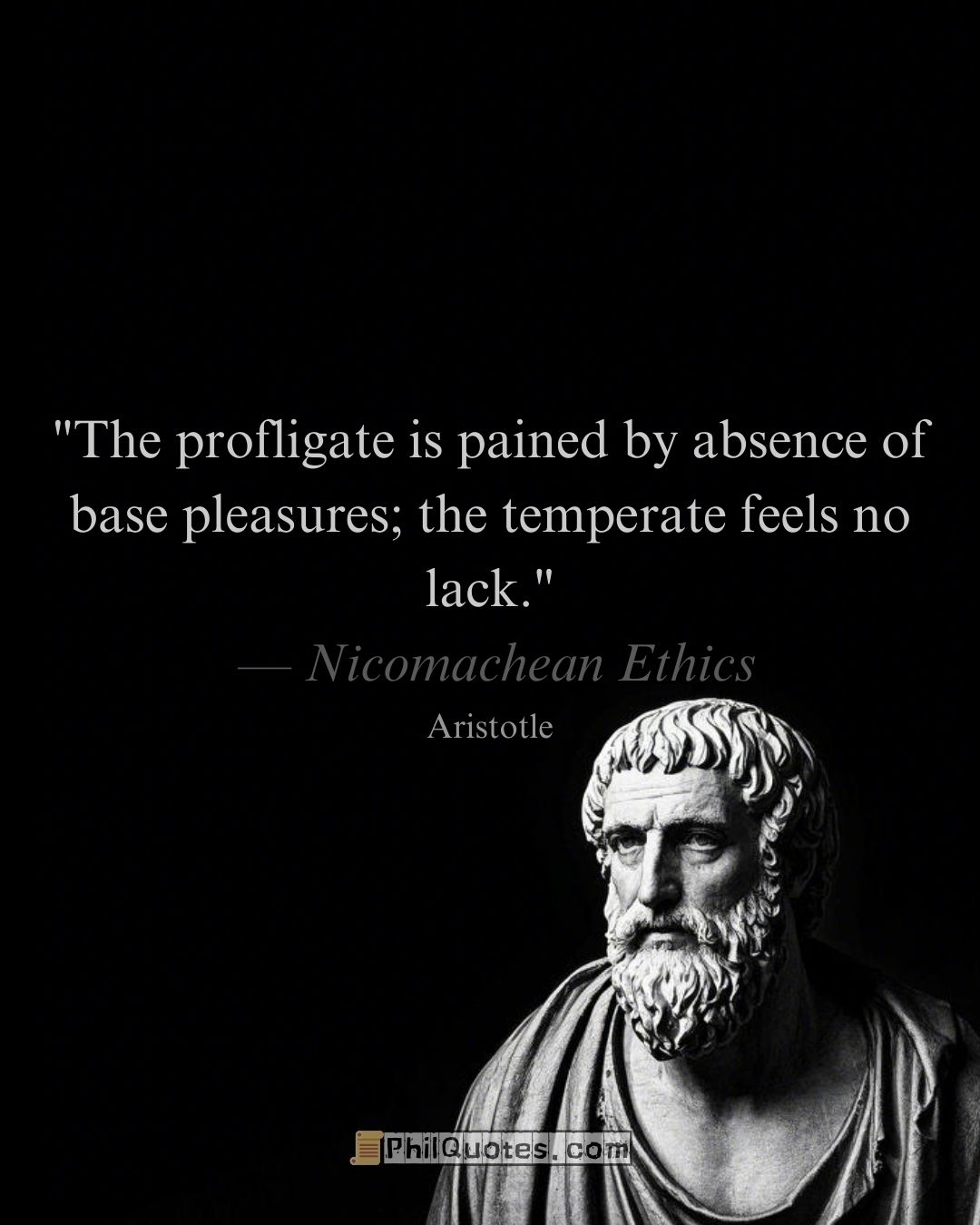
46. “The profligate is pained by absence of base pleasures; the temperate feels no lack.”
— Aristotle, Nicomachean Ethics, Book III, Chapter 11
(Translated by W.D. Ross)
47. “Courage involves pain, for enduring the terrible is harder than abstaining from pleasure.”
— Aristotle, Nicomachean Ethics, Book III, Chapter 9
(Translated by W.D. Ross)
48. “The brave act for the noble; the foolhardy act for show, the coward from fear.”
— Aristotle, Nicomachean Ethics, Book III, Chapter 7
(Translated by W.D. Ross)
49. “Temperance moderates natural desires (food, drink), not eliminating but ordering them.”
— Aristotle, Nicomachean Ethics, Book III, Chapter 11
(Translated by W.D. Ross)
50. “Virtue and vice are in our power; we are ourselves the craftsmen of our character.”
— Aristotle, Nicomachean Ethics, Book III, Chapter 5
(Translated by W.D. Ross)
Here’s the bottom line: Aristotle isn’t here to judge your past—he’s here to upgrade your future. Whether it’s mastering voluntary choices, practicing courage in daily life, or fixing that late-night snack habit (hey, temperance isn’t just for monks), his wisdom is your cheat code.
Ready to geek out? Visit PhilQuotes.com now—we’ve turned Aristotle’s quotes into shareable visuals (images + bite-sized text) perfect for Instagram stories or group chats. And if one hits home, tag a friend who needs it! Got a take on free will vs fate? A habit you’re proud of? Comment below—we’ll feature the best stories next week. Share this with anyone who’s ever said “I had no choice!” (Spoiler: Aristotle disagrees.) Let’s make ethics go viral—one click, one choice, at a time. 🔥